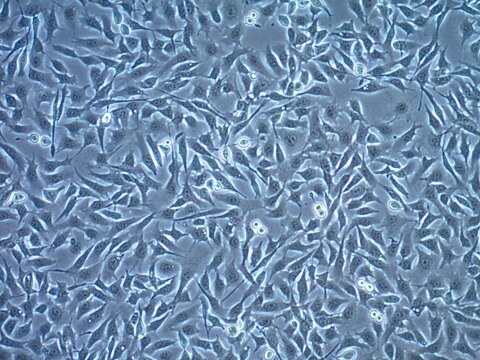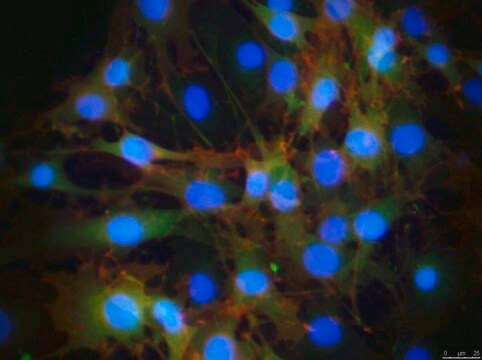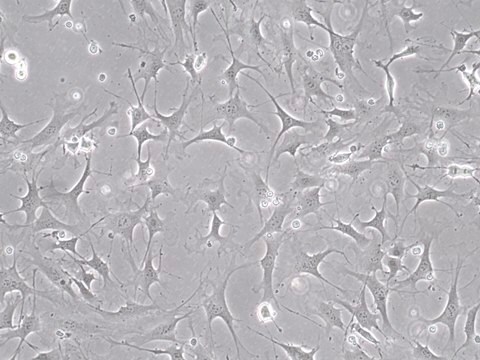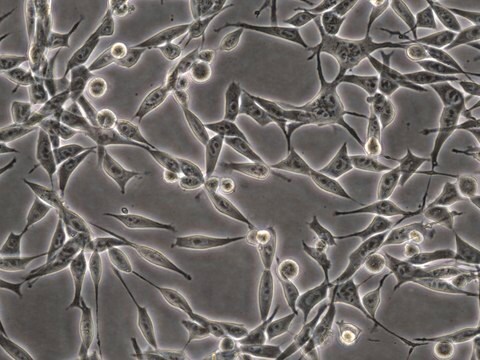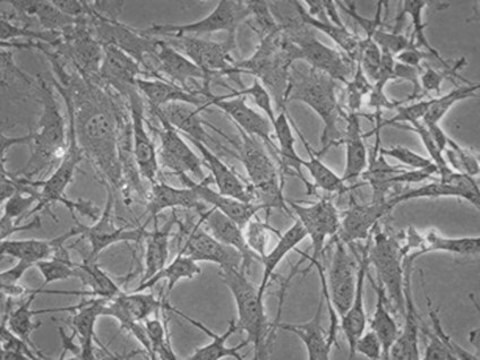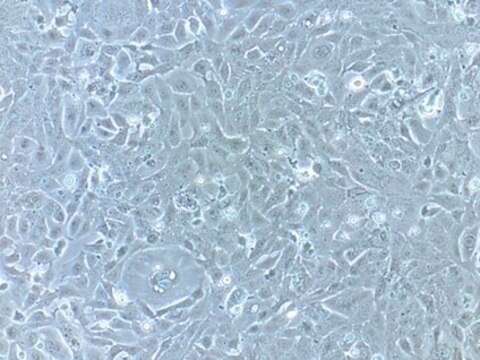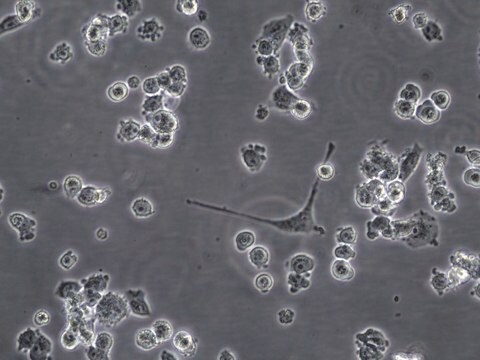SCC490
Mouse OP9-DL4-7FS Notch Ligand Cell Line

Sinonimo/i:
DL4 cell line, Delta-like 4 cell line, Notch ligand cell line, OP9-DL4, OP9-DL4 cell line
Autenticatiper visualizzare i prezzi riservati alla tua organizzazione & contrattuali
About This Item
Codice UNSPSC:
41106514
NACRES:
NA.81
Prodotti consigliati
Origine biologica
mouse
Livello qualitativo
Confezionamento
vial of ≥1X10⁶ cells/vial vial
Produttore/marchio commerciale
Millipore
tecniche
cell culture | mammalian: suitable
Condizioni di spedizione
liquid nitrogen
Temperatura di conservazione
−196°C
Applicazioni
- Each vial contains > 1X106 viable cells.
- Cells are tested negative for infectious diseases by a Mouse Essential CLEAR Panel by Charles River Animal Diagnostic Services.
- Cells are verified to be of mouse origin and negative for interspecies contamination from human, rat, Chinese hamster, Golden Syrian hamster, and nonhuman primate (NHP) as assessed by a Contamination Clear panel by Charles River Animal Diagnostic Services
- Cells are negative for mycoplasma contamination.
Caratteristiche e vantaggi
OP9-DL4-7FS is a stable bone marrow derived stromal cell line expressing the Notch ligand-Delta like 4 (DL4) and human IL-7, FLT3L, and SCF (7FS) for stem cell differentiation applications.
Descrizione del bersaglio
OP9-DL4-7FS is a stable bone marrow derived stromal cell line expressing the Notch ligand- Delta like 4 (DL4) and human IL-7, FLT3L, and SCF (7FS) ectopically.
Notch signaling controls multiple cell-fate decisions. Four Notch receptors (Notch 1- Notch 4) have been identified in mammals. These receptors interact with Jagged or Delta-like (DL) family members of Notch ligands. This is followed by cleavage of the intracellular domain of Notch and its subsequent translocation into the nucleus, where it binds with transcription factors and activates transcription of various downstream target genes. Notch signaling is essential in early T- cell lineage commitments. Bone marrow progenitor cells expressing constitutively-active Notch develop into CD4 and CD8 double positive T cells rather than B cells. They also play an important role in development of CD4+ and CD8+ single positive cells from double positive precursor thymocytes, in addition to development of T-cells with αα+ TCRs. Of the 4 Notch receptors, Notch1 (N1) receptor signaling has been shown to be sufficient for T cell development. The delta like ligands are physiologically relevant N1 ligands. DL1 interacts with both N1 and Notch 2 (N2) to induce T- cell lineage commitment. However, DL4 interacts specifically only with N1 and supports T cell commitment and maturation both in vitro and in vivo. Moreover, results from previous binding studies show that binding between DL1 and N1 is weak as opposed to the stronger binding between DL4 and N1. Of the DL1 and DL4 delta like ligands, DL4 exhibits greater capacity to activate the Notch pathway in hematopoietic progenitor cells.
Human hematopoietic stem cells (HSCs) require additional cytokines for survival and propagation. Three important components are added separately to HSC/OP9-DL cocultures. These components are Interleukin-7 (IL-7), stem cell factor (SCF), and FMS-like tyrosine kinase 3 ligand (FLT3L). To circumvent the costly addition of these cytokines, an improved OP9-DL4 cell line was designed and designated OP9-DL4-7FS.5 This improved OP9 cell line was transduced to express human IL-7, FLT3L, and SCF (7FS), making it a highly cost-efficient cell line and improved version of the original OP9-DL4 cell line. In addition, the cerulean fluorescent protein (CeFP) gene was substituted for GFP using restriction enzymes to distinguish the new “7FS” cell line from the original OP9-DL4 cell line which had been sorted for GFP expression.
Source
OP9-DL4-7FS cells were genetically modified from OP9 stromal cells derived from mouse bone marrow.
References
1. Methods Mol Biol 2023, 2580:249-260.
2. Immunity 2002, 17(6): 749-756.
3. J Orthop Sci. 2005, 10(6): 589-594.
4. Curr Opin Immunol. 2007, 19(2): 163-168.
5. Cold Spring Harb Protoc. 2009, 2009(2): pdb.prot5156.
Notch signaling controls multiple cell-fate decisions. Four Notch receptors (Notch 1- Notch 4) have been identified in mammals. These receptors interact with Jagged or Delta-like (DL) family members of Notch ligands. This is followed by cleavage of the intracellular domain of Notch and its subsequent translocation into the nucleus, where it binds with transcription factors and activates transcription of various downstream target genes. Notch signaling is essential in early T- cell lineage commitments. Bone marrow progenitor cells expressing constitutively-active Notch develop into CD4 and CD8 double positive T cells rather than B cells. They also play an important role in development of CD4+ and CD8+ single positive cells from double positive precursor thymocytes, in addition to development of T-cells with αα+ TCRs. Of the 4 Notch receptors, Notch1 (N1) receptor signaling has been shown to be sufficient for T cell development. The delta like ligands are physiologically relevant N1 ligands. DL1 interacts with both N1 and Notch 2 (N2) to induce T- cell lineage commitment. However, DL4 interacts specifically only with N1 and supports T cell commitment and maturation both in vitro and in vivo. Moreover, results from previous binding studies show that binding between DL1 and N1 is weak as opposed to the stronger binding between DL4 and N1. Of the DL1 and DL4 delta like ligands, DL4 exhibits greater capacity to activate the Notch pathway in hematopoietic progenitor cells.
Human hematopoietic stem cells (HSCs) require additional cytokines for survival and propagation. Three important components are added separately to HSC/OP9-DL cocultures. These components are Interleukin-7 (IL-7), stem cell factor (SCF), and FMS-like tyrosine kinase 3 ligand (FLT3L). To circumvent the costly addition of these cytokines, an improved OP9-DL4 cell line was designed and designated OP9-DL4-7FS.5 This improved OP9 cell line was transduced to express human IL-7, FLT3L, and SCF (7FS), making it a highly cost-efficient cell line and improved version of the original OP9-DL4 cell line. In addition, the cerulean fluorescent protein (CeFP) gene was substituted for GFP using restriction enzymes to distinguish the new “7FS” cell line from the original OP9-DL4 cell line which had been sorted for GFP expression.
Source
OP9-DL4-7FS cells were genetically modified from OP9 stromal cells derived from mouse bone marrow.
References
1. Methods Mol Biol 2023, 2580:249-260.
2. Immunity 2002, 17(6): 749-756.
3. J Orthop Sci. 2005, 10(6): 589-594.
4. Curr Opin Immunol. 2007, 19(2): 163-168.
5. Cold Spring Harb Protoc. 2009, 2009(2): pdb.prot5156.
Stoccaggio e stabilità
OP9-DL4-7FS cells should be stored in liquid nitrogen. The cells can be cultured for at least 10 passages without significantly affecting cell marker expression and function.
Altre note
This product is intended for sale and sold solely to academic institutions for internal academic research use per the terms of the “Academic Use Agreement” as detailed in the product documentation. For information regarding any other use, please contact l
Esclusione di responsabilità
Unless otherwise stated in our catalog or other company documentation accompanying the product(s), our products are intended for research use only and are not to be used for any other purpose, which includes but is not limited to, unauthorized commercial uses, in vitro diagnostic uses, ex vivo or in vivo therapeutic uses or any type of consumption or application to humans or animals.
Codice della classe di stoccaggio
10 - Combustible liquids
Classe di pericolosità dell'acqua (WGK)
WGK 3
Punto d’infiammabilità (°F)
Not applicable
Punto d’infiammabilità (°C)
Not applicable
Certificati d'analisi (COA)
Cerca il Certificati d'analisi (COA) digitando il numero di lotto/batch corrispondente. I numeri di lotto o di batch sono stampati sull'etichetta dei prodotti dopo la parola ‘Lotto’ o ‘Batch’.
Possiedi già questo prodotto?
I documenti relativi ai prodotti acquistati recentemente sono disponibili nell’Archivio dei documenti.
Il team dei nostri ricercatori vanta grande esperienza in tutte le aree della ricerca quali Life Science, scienza dei materiali, sintesi chimica, cromatografia, discipline analitiche, ecc..
Contatta l'Assistenza Tecnica.
